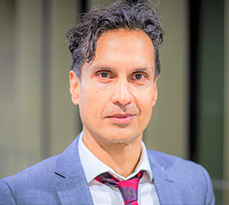Publish or perish? It took courage for the organisation Patient Innovation to shift from pure research to providing global access to rare-disease solutions, says a study co-authored by Professor Shahzad Ansari of Cambridge Judge Business School.
Academic careers, according to the cliché, are based on an unspoken ultimatum to “publish or perish”: landing research papers in leading journals is a ticket to tenure, and failure to do so can careen a promising scholar off the rails.
So how did non-profit medical platform Patient Innovation shift its core purpose from academic research on user innovation to providing global access to these innovations – most of them tied to finding solutions to rare diseases?

A paper published in the Journal of Management Studies, co-authored by Shahzad Ansari, Professor of Strategy & Innovation at Cambridge Judge Business School, finds that moral emotions, serendipitous inspiration and user communities helped create this promising model of organisational repurposing.
“As creating social impact became the organisation’s core mission, it put academic research on the backburner despite pressure to publish,” says the study – which cites approvingly quotes by chemist Louis Pasteur (“Chance favours the prepared mind only”) and anthropologist Margaret Mead (“Never doubt that a small group of thoughtful, committed citizens can change the world. Indeed, it’s the only thing that ever has.”)
Patient Innovation’s origins date to 2011 as a pure research platform, and a decade later the Portugal-based organisation has more than a million clicks a year and more than 3,000 medically validated solutions – many of them “homemade” user-driven solutions to rare diseases. The organisation was recently honoured by the United Nations with an SDG (Sustainable Development Goals) Good Practices Award.
The study – entitled “From ‘publish or perish’ to societal impact: organizational repurposing towards responsible innovation through creating a medical platform” – is co-authored by Madeleine Rauch of Copenhagen Business School and Shaz Ansari of Cambridge Judge Business School.
Co-author Shaz Ansari of Cambridge Judge discusses five aspects of the study’s findings and conclusions:
The study is based on the academic concept of “framing”. We show how interactions led to a change in the core frame underpinning the organisation’s purpose – tracing how the academic research frame became peripheral to the new societal impact frame.
Four phases defined the emergence of this new frame. First there was a total focus on academic research; then a key moment related to a surprising survey discovery that 8% of patients and caregivers engaged with innovations considered novel by medical professionals; thirdly a direct engagement with affected people; and then prioritising social mission despite institutional pressures to publish to advance their careers.
We further identify three mechanisms for this transformation. Serendipitous inspiration played a key role in helping people recognise the potential for treating more people in need; moral emotions amplified the project’s potential impact and generated energy for team members to pursue a collective cause over self-interest; and the support of socially conscious users including some prominent supporters helped to scale up the project.
We highlight the importance of spontaneity in the organisation’s transformation. In our interviews with people involved in Patient Innovation, people used words and phrases like “luck”, “surprising occurrence” and “a wow accident” to describe potential breakthroughs in treating rare diseases. This was an important aspect in the group’s transformation.
It was not an easy solution for many involved to shift their focus. Despite their feeling of empathy towards patients and their families, and disappointment with Big Pharma’s lack of interest in rare diseases, people thought hard about the sacrifices involved. As one of our interviewees said: it’s “pretty clear on what gets you to the top”. Similarly, there has been a slow shift from subscription to open-access publishing. Inertia holds back change, but doesn’t stop it.


